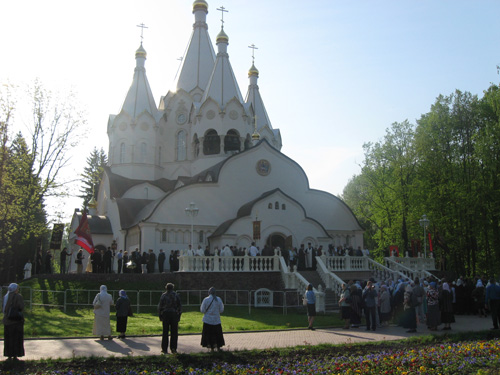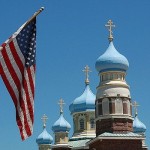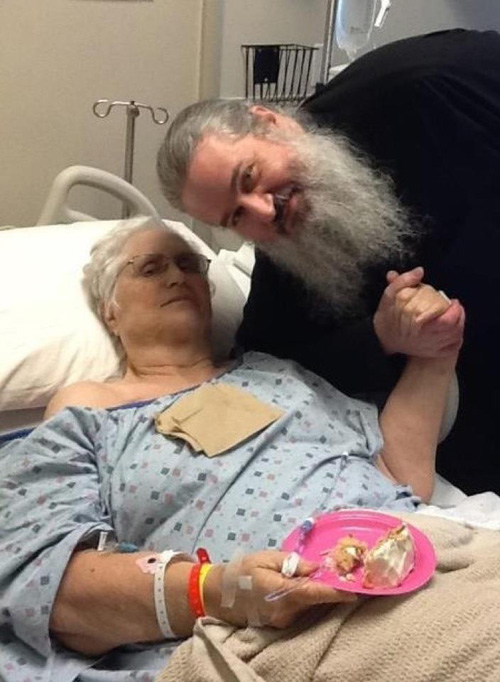by Fr. John Whiteford
One of the highlights of my life was in 2007, when I was chosen to be one of the delegates from the Diocese of Chicago and Mid-America to go to Russia for the signing of the Act of Canonical Communion, when the Russian Orthodox Church Outside of Russia was finally reconciled with the Church inside Russia, which had been administratively separate since the late 1920’s, due to Soviet interference in Church affairs. This was signed on May 17, 2007, in Christ the Savior Cathedral – a Church that had been destroyed by Stalin, but rebuilt after the collapse of the Soviet Union.

The Church of the New Martyrs at Butovo
One of the most moving aspects of that trip was to participate in the consecration of a Church at Butovo, which was a Soviet killing field, where tens of thousands of Orthodox Christians were martyred. Before the service, the clergy who would serve went into the lower Church to vest. I noticed that the walls had very nice icons all the way around the Church, but didn’t pay attention to what they depicted, assuming that it would be the usual mix of icons you see in a Church – but then Fr. Vladimir Boikov (a good humored Chinese-Mongolian-Russian priest I had met many years before in Australia) pointed out that these icons were all icons of the various known martyrs of Butovo, who had been killed at this very place by the Communists. When the Church was being constructed, family members of the martyrs of Butovo commissioned these icons. This realization brought home the full impact of where we were, and what we were here to do. These were not just any icons, this was not just any Church, and this would not be just any service either.
![]()
The Martyrs of Butovo
We went up to the main Church, which has three altars, all of which would be consecrated on this day, and stood there, waiting for the Patriarch to arrive. After the greeting of the Patriarch, we began the service of the Great Consecration of the Church. The altars were just wooden frames, with the table top set aside. At the beginning of the service, the first thing that is done is that the bishops put on white carpenters’ aprons, and the Holy table is constructed. My one part in this service was to help lift the top of the holy table, and hold it so that the Patriarch could bless the top and bottom of it with holy water, and then to place it onto the frame. While the Patriarch was doing this with the main altar, other bishops, including Metropolitan Laurus, were doing the same things with the two side altars. The table top was nailed to the frame, and wax was poured over the nails to seal it. The top of the table was washed with hot water, then with wine, and then anointed with holy chrism. Then the holy table was vested with its cover. Then a bishop went around the Church and anointed the four walls with chrism.
There was a Moscow Patriarchal priest standing nearby, who was one of the ones whose job it was to make sure that the services went off smoothly. At one point he was telling me to do something, but I can’t now remember what it was. Fr. Vladimir explained that I did not speak Russian, and that I was from Texas – he seemed to take a particular delight in pointing that out to people. This priest commented to Fr. Vladimir that it must be difficult for me to be in a service that was all in Slavonic. Fr. Vladimir explained that I knew what was going on, and was happy to be there. In any case, I thought it was nice that he expressed such concern.
Towards the end of the service of the consecration, we went in a procession around the Church, being preceded by the relics that would be finally placed in the altars. Once back inside the Church, the service of the Great Consecration ended, and the Liturgy began.
Generally, I tried to stay out of the way. I was used to being in services that were all or mostly in Slavonic, however, back in the US, most everyone speaks English and the directions given to the clergy in the altar are usually in English, or if not, when it is clear you didn’t get it the first time in Russian, you get it the second time in English. But it was all in Russian here, and so I tried to stay close to Fr. Vladimir.
I remembered, as a relatively new convert when communism in Russia finally collapsed on the feast of the Transfiguration in 1991, and being struck by the fact that this was the answer to all of our prayers for the salvation of Russia, and that it would be delivered from the yoke of the Soviets. Of course, all was not made right in a day, but from that time on, we witnessed how God has been restoring the Russian Church to health and strength, and on this day the contrast was between the Soviet past and the present were undeniable.
After the clergy had communed, Fr. Vladimir turned to me and said with his Aussie accent,
“So have you met the Patriarch yet?”
I responded that I had received communion from him twice now, but that I couldn’t say we had been properly introduced. So he grabbed me by the sleeve, and said,
“Come on, mate.”
He had threatened earlier that he would introduce me to the Patriarch and lift up my sticharion to show him my cowboy boots as he did so. I was fairly certain that he was about to make good on that threat, but he didn’t. After we both had received his blessing, Fr. Vladimir told him who I was, that I was from Texas, and that although I could not speak Russian I had been a vocal advocate for the reconciliation of the Russian Church. The patriarch thanked me, and said that he hoped I would continue to be an advocate for unity in the Church. It was a brief exchange, but he had a very warm expression on his face. I was already impressed by him, but I came away all the more impressed.
 After the service, we all headed for a large tent in which there was another banquet. Fr. Vladimir and I sat across from some Russian dignitaries. One of them was Sergei Baburin, who was a member of the Russian Duma – I wouldn’t remember that, except that we exchanged cards. Next to him was a man whose name I can’t remember, but he was wearing a medal which indicated that he was a hero of the Soviet Union, which is something like the Congressional Medal of Honor. Fr. Vladimir introduced me, and again explained my inability to converse in Russian, and that I had been an advocate of the reconciliation of the Russian Church. The man with the medal commented that I had been spending so much time defending the unity of the Russian Church that I had acquired the face of a Russian.
After the service, we all headed for a large tent in which there was another banquet. Fr. Vladimir and I sat across from some Russian dignitaries. One of them was Sergei Baburin, who was a member of the Russian Duma – I wouldn’t remember that, except that we exchanged cards. Next to him was a man whose name I can’t remember, but he was wearing a medal which indicated that he was a hero of the Soviet Union, which is something like the Congressional Medal of Honor. Fr. Vladimir introduced me, and again explained my inability to converse in Russian, and that I had been an advocate of the reconciliation of the Russian Church. The man with the medal commented that I had been spending so much time defending the unity of the Russian Church that I had acquired the face of a Russian.
It was interesting to ponder that there was a time when the only thing I knew about Russia was that they were the enemy, and I thought that the only way I would ever have visited Russia was the way Slim Pickens did in Dr. Strangelove… riding a hydrogen bomb.
It was on this trip that I happened to be standing in front of the Kremlin and bumped into that family from Mexico.
When I first converted to the Orthodox Faith, my mother predicted that it would not be long before I moved on to something else. Given the winding nature of my spiritual journey up to that point, I can hardly blame her, but as the years went on, she came to see that this time it was for real. Eventually, she even came to respect my decision, though she never came to fully understand it herself.

My mother, on her birthday, not long before her repose
Being in the Orthodox Church has not been a journey through a spiritual Never-Never land – there have also been many painful trials and tribulations. I also do not pretend to have attained all that I should have or hope to spiritually, but I have never regretted the decision, and have a deep sense that I have “seen the True Light” and “found the True Faith.” There is always more to discover, but I at long last know where the treasure is to be found.
When I was a boy, I remember riding in the bed of my father’s truck, and noticed that as I sat looking in the opposite direction we were going, I could only see where we had been, but could only guess where we were going to next from where we had been… but of course a boy doesn’t worry too much about that when his father is the one doing the driving. As I look back on my life up to this point, I can see how God has guided me – sometimes gently, and sometimes with a slap upside the head – but usually I was only aware of it as I looked back in retrospect.
One can’t be sure what will come next, but my Father is doing the driving.
Fr. John Whiteford is the priest of St. Jonah Orthodox Church in Spring, TX.
You can read the entire series from Part One by clicking here.

Thank you for posting these here, Fr John Peck. I’ve greatly enjoyed reading the series.
Thank you so much for this wonderful series of adventure. I was inspired to research more, and have begun reading the fathers mentioned by you in earlier postings. I have been reading Christ in the Psalms by Fr. Patrick Reardon, and have now added My Life In Christ by St. John of Kronstadt. I missed my stop on the train twice due to this reading, so these have captured my attention and touched my heart.
One thing troubles me, and I hear it often, concerns thinking like a Protestant versus thinking like an Orthodox. Usually it is applied vaguely and broadly. I’ve never heard the critique applied to a single particular thought, which means that I have yet to discern the difference between the two.
I grew up as a Presbyterian, and was highly criticized for not thinking like a Protestant. As an example, I never easily agreed that sanctifying the bread and grape juice could allow it to truly and only remain mere Wonder Bread and Welch’s, or what’s the sanctification for? But, that’s just a whopping big and obvious area of difference. The overall Protestant versus Orthodox thinking pattern seems much more subtle.
Exactly what is this, “thinking like a Protestant” as opposed to “thinking like an Orthodox?” And, if you are thinking as a Protestant, what questions can one ask to get on the road to thinking like an Orthodox believer? Is there something to watch for, a series of landmarks, or other guidance that would help?
Thanks so much for this series! I’m very blessed that I’ve gotten to read it all this evening. I’ve been acquainted with Orthodoxy for several year now, but only exploring it for about a year now. A lot of Fr John (W)’s stages sound very much like my own. Thanks for this site and the encouragement it gives to my journey.
Hi Lillibet,
I saw your questions on here and I thought they are indeed good questions. I certainly don’t have any definitive answer for you regarding how to change one’s thinking from Protestant to Orthodox aside from simply living the Orthodox faith. I wrestled with so much of the Orthodox theology before I realized that Orthodoxy is a way of life that has a set of beliefs that accompany it rather than a set of beliefs that dictate one’s way of living.
If you are not already a part of a local parish, I would recommend you further your journey by checking one out. Also, a very short and simple book that has been instrumental in changing my life is A Pilgrim and His Way. I would highly recommend that.
Thanks Jeremy for your reply. I’ve been doing what I am able to live Orthodox, with the assistance and advice of friends. Getting to a parish is not so easy. I know each day, with each reading, I’ll find another 50,000 sins that need addressing. (Okay, I exaggerate a bit. Just a wee tad of a bit.) Ah, the blessing/curse of maturity with a good memory. The trick is to avoid repetition. Repeating may be the key to learning, but it is best applied to so serious unlearning.
The good news is I decided on Orthodoxy, I’ve found that doing what is suggested results in a considerable improvement in outlook, cheer, hope, kindness, and patience — except of course on days when I want patience now! Initially, I knew that I wasn’t going to get to any church at all, as my ‘bad cold’ was really a medication resistant bug, that turned out to require about fourteen months taking pills by the fistful, and at least on that front, all is well.
At the beginning of my search, through the end of the infectious part of recent medical problems, I felt I was far to sin-filled to face God in a sanctuary. This worked out well, as when the diagnosis was made, I hadn’t, and didn’t want to share my wealth of germs with people I would want to call ‘friend.’ I did find my way into two Chicago parishes when my landlord gave me a ride, but not as a regular, mostly due to an overuse of Romanian or Russian in services. Ultimately, I finally was declared able to go to church without being an updated Typhoid Mary, but also had to cope with unset fractures that weren’t healing. Originally doctorst thought I had bone cancer (not), and more bones were breaking for no known cause and refused to operate. Now, it’s too late to do a simple fix, even with insurance, so I have to get enough funds to pursue that route.
Having too little time where the pain is controlled enough to work full out, and for not being paid for my work, I’m also officially broke. I have clients with several complicated legal cases, which meant I had to do the work, paid or not, because those are the rules and judges won’t let me out, These clients, self described as “honorables” one and all, decided they’d rather spend their money on a few Mercedes and a couple of million dollar weddings for their offspring. This spending occurred while I was paid about $3.00 per hour, If I bail out, I also lose the chance for contingent fees on other cases still pending for these same clients. If I can get enough money together for what insurance won’t cover, I’ll get everything fixed and could go on a long time after that.
I’ll be selling all my possessions, including my library, furniture, musical instruments, music, and so on. It’s essentially a fire without that irritatingly smelly smoke damage.
Thankfully, the Orthodox church has many options, including links to services online, and Ancient Faith Radio provides homilies from many wonderful preachers. Praying, studying, reading and fasting are free, and so I am at the end, richer than any measure. As for thinking like an Orthodox, I’ll keep doing, and will keep on reading luminaries like St. John of Kronstadt, whose words have soothed and seared my heart. Maybe I’ll figure it out. I’ll keep going best I can until I do, or at least understand what it is I don’t understand.
Lillibet,
If you get it figured out let me know. You’ll probably be the first 🙂
I apologize for taking so long to reply. Feel free to contact me through my website (just click on my name). I usually respond much more quickly to emails than to website comments. I hope everything works out with the medical expenses and challenges. I pray for peace for your spirit.
Really enjoyed reading all your posts. I too grew up Nazarene, was a PK, went to Olivet Naz. Just became Orthodox (chrismated) after a year of being a catechumen . I have had many of the same experiences going to Nazarene and nondenominational worship services. I was ready to stop going to church. But, my friend kept telling me of how she loved her services. It took me about 10 years to think seriously about converting. My husband attends with me but is slower to “take the plunge”. He supports me though. When I told my Mom about me converting, she said ” but we’re not Greek”!